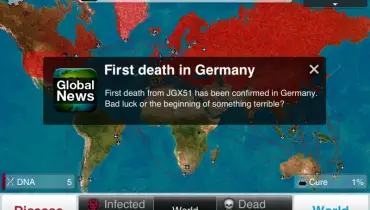5 Unexpected Career Skills You Can Learn from Video Games
![5 Unexpected Career Skills You Can Learn from Video Games [node:title]](/sites/default/files/styles/large/public/video%20game%20play%20on%20tv%20or%20monitor%20skills%20learned.jpeg?itok=0swcQq8m)
As a video game enthusiast, you probably spent endless hours playing video games and being lambasted for wasting your time on such a mindless droll. But what you, your mom, and your dad probably didn’t realize is that this ‘mindless’ time spent in virtual worlds was actually preparing you for the real world, developing skills that would help you shine from the shop floor to the board room.
“Whether it’s a sports simulator or first-person-shooter, gaming prepares us for a range of situations at work: from those that need strategic decision-making to teamwork under pressure,” says Al Alof, CEO of gaming marketplace Chicks Gold.
As modern workplaces and employees turn toward less conventional methods for skill-building, Alof is championing gaming as a viable means for developing skills that can elevate workers from entry-level roles to executive positions.
Here are five specific ways in which video games promote personal growth and shape professionals for success in today’s fast-paced, collaborative work environment:
From Raid Teams to Work Teams
One of the primary skills that video games - especially multiplayer games - promotes is teamwork, where collaboration is necessary for success. Games like Fortnite, League of Legends, or Minecraft strongly promote teamwork through communication, where success is largely contingent on collaboration.
“Multiplayer games force players to work together toward common goals, often under pressure, while communicating effectively to get the most out of each team member's abilities,” says Alof. “This perfectly mirrors the skills required when you’re in an office working as part of a team.”
Whether in a corporate environment or part of a virtual post-apocalyptic faction, it’s all about collaboration. Multiplayer games teach people to delegate, trust their team members, and adapt their communication styles based on who they are interacting with - just like in the workplace.
From Gaming Puzzles to Business Solutions
Games that require strategic thinking and problem solving help develop critical analytical skills that translate directly to workplace challenges. From puzzle games like Portal teaching systematic problem breakdown to strategy titles like Civilization demanding resource management, different genres build distinct problem-solving capabilities.
“Strategy games mirror real-world problem solving perfectly,” explains Alof. “Players have to analyze multiple variables, assess risks and rewards, and make decisions quickly - exactly what's needed when tackling complex business challenges.”
These games train players to identify patterns, break down complex problems into manageable parts, and develop creative solutions under pressure. For example, games like Factorio or Satisfactory require players to optimize complex systems and identify bottlenecks - skills that directly parallel process improvement in business environments.
Digital Leadership Academy
Modern multiplayer games have become sophisticated training grounds for tomorrow's business leaders, particularly in titles like World of Warcraft where raid leaders coordinate 20-25 players in real-time missions.
“Gaming develops leadership skills in a unique way,” explains Alof. “When leading a raid or a large team, or managing a guild, players have to master clear communication, delegate effectively, and make split-second decisions that impact their entire team and the outcome of a game - exactly the skills needed in high-pressure business environments.”
Virtual leadership roles teach players to manage distributed teams, often across different time zones and cultures, providing constructive feedback under pressure and adapting their communication style to diverse team members. In fact, research from Brigham Young University found that teams of employees engaging in gaming demonstrated 20% higher productivity than with traditional team-building exercises.
Adapt to Win
Modern games like Overcooked! 2 and battle royale titles constantly throw unexpected challenges at players, training them to thrive in fast-changing environments where quick adaptation is an absolute must for survival.
“The ability to pivot strategies instantly and implement backup plans without hesitation is a highly coveted skill in the modern workplace,” notes Alof. “When gamers come across a new situation, they don't freeze - they analyze, adapt, and overcome. This directly mirrors how successful professionals handle market changes and industry disruptions.”
Through repeated exposure to dynamic scenarios, players develop flexible thinking patterns and resilience. Whether it's adjusting tactics mid-match or completely overhauling strategy based on opponent behavior, games create neural pathways that strengthen adaptability.
Time Management & Multitasking
Real-time strategy (RTS) games like Age of Empires and simulation titles like Two Point Hospital train players to juggle multiple priorities while managing limited resources - skills that directly translate to workplace efficiency.
“In these games, effective multitasking isn't about doing everything at once," Alof explains. “It's about prioritization and resource allocation. Players learn to identify critical paths, delegate effectively, and maintain focus across multiple objectives - all essential workplace skills.”
Games teach players to handle increasing levels of complexity without sacrificing performance quality. Whether managing a virtual hospital's staff schedules or coordinating military units across multiple battlefronts, players develop the mental agility needed to handle complex workflows and competing deadlines in professional settings.
In Conclusion
The gaming industry has the power to change how we develop professional capabilities. What is fascinating is how games create risk-free environments for experimenting with complex decision-making. Players can test different leadership styles, try unconventional problem-solving approaches, and learn from failures without real-world consequences.
“Acting as virtual training grounds, games are particularly valuable for younger professionals who might not yet have opportunities to lead major projects or manage large teams in their careers,” concludes Alof. “The skills they develop through gaming - from resource optimization to crisis management - give them a significant advantage when those opportunities do arise. In many ways, games are democratizing access to leadership experience and professional development.”







![5 Common Work Habits That Are Career Killers and Sabotaging Your Productivity [node:title]](/sites/default/files/styles/front_featured__front_/public/Businesspeople%20working%20together%20in%20office.jpeg?itok=gBJ3KeMu)

![5 Emerging Trends in Social Media Marketing That Can Boost Your Job Search [node:title]](/sites/default/files/styles/front_featured__front_/public/man-holding-smartphone-social-media-marketing-trends.jpeg?itok=Fy_e_Yte)
![Let's Just Admit We Don't Have the Bandwidth for Workplace Jargon [node:title]](/sites/default/files/styles/front_featured__front_/public/woman%20at%20work%20full%20of%20colorful%20stickers%20workplace%20jargon.jpeg?itok=onatXKOs)

























